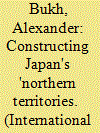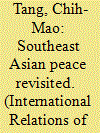| Srl | Item |
| 1 |
ID:
115017


|
|
|
|
|
| Publication |
2012.
|
| Summary/Abstract |
This article seeks to contribute both to the scholarly debate on Japan's territorial dispute with USSR/Russia and to the broader body of academic literature devoted to the ideational factor in foreign policy. By focusing on the formative years of the dispute and examining the variety of symbolic meanings attached to the Soviet-occupied islands by the domestic actors, this article examines the process of the emergence of the idea of the 'Northern Territories' as a national mission. It argues that the formation and institutionalization of the idea of the 'Northern Territories' in its present form can be traced to a complex web of power relations among the domestic actors, none of which perceived the return of the territory as its ultimate goal.
|
|
|
|
|
|
|
|
|
|
|
|
|
|
|
|
| 2 |
ID:
115013


|
|
|
|
|
| Publication |
2012.
|
| Summary/Abstract |
This paper argues that Malaysia-Indonesia relations have become increasingly problematic and complex to manage in a post-Mahathir/Suharto era. The unequal pace of the democratization pattern in both countries has largely contributed to this state of affairs. The four key 'transnational' variables or determinants such as migrant labor, mass media, non-governmental organizations and the Anwar factor have significantly impacted on Malaysia's ties with Indonesia against the backdrop of the unequal domestic political changes. These four variables have over the years become more prominent in bilateral relations - often in negative terms. More specifically, they represent the dynamics of the people-to-people dimension in bilateral ties. As such, the deterioration in people-to-people relations threatens to significantly reshape government-to-government diplomacy. Bilateral relations could yet face their severest contradictions when official diplomacy is incapable of reflecting accurately popular sentiments. In effect, the roles of state and non-state actors have been instrumental in influencing recent developments of Malaysia-Indonesia relations.
|
|
|
|
|
|
|
|
|
|
|
|
|
|
|
|
| 3 |
ID:
115016


|
|
|
|
|
| Publication |
2012.
|
| Summary/Abstract |
This article examines China's and Taiwan's humanitarian assistance to Haiti, as well as the extent to which China and Taiwan - as non-Development Assistance Committee (DAC) donors - adhered to the DAC-established humanitarian assistance architecture. It argues that China's and Taiwan's emergency aid was comparable with the DAC donorship in terms of its declaratory commitment to altruism and the pursuit of strategic objectives. Both Beijing and Taipei considered cross-Strait relations and domestic and international public opinion when strategizing emergency aid. The primacy of politics determined a divided China's modalities of aid, funding levels, and institutional framework. The article concludes that strategic considerations - including cross-Strait politics, a suspension of cross-Strait diplomatic rivalry notwithstanding - are at least as significant as altruism in driving China's and Taiwan's humanitarian assistance.
|
|
|
|
|
|
|
|
|
|
|
|
|
|
|
|
| 4 |
ID:
115014


|
|
|
|
|
| Publication |
2012.
|
| Summary/Abstract |
The scholarship has argued that the Association of Southeast Asian Nations (ASEAN) security management, outweighing democracy and economic interdependence, is the main force constituting Southeast Asian peace. However, although neither democracy nor economic interdependence significantly contributes to peacefulness in Southeast Asia, this study posits and finds that prior literature overlooks the possible conflict-constraining effect of a ruling group's desire and resolve to pursue economic development with liberal capitalist economic policy, which causes that the pacifying effect of ASEAN security management to be exaggerated. This study distinguishes the conflict-constraining effect of liberal capitalist economic development policy from the outcome effects of economic interdependence and the ASEAN security management and argues that the common interests and preferences of adopting economic liberalization policy for economic development exert a more significant effect in preventing conflicts in Southeast Asia. Empirical analyses of the onset of militarized interstate disputes between Southeast Asian states from 1950 to 2000 support this argument.
|
|
|
|
|
|
|
|
|
|
|
|
|
|
|
|
| 5 |
ID:
115015


|
|
|
|
|
| Publication |
2012.
|
| Summary/Abstract |
Amitav Acharya and Barry Buzan wrote in volume seven of this journal that 'the main ideas in this discipline (of international relations) are deeply rooted in the particularities and peculiarities of European history, the rise of the West to world power, and the imposition of its own political structure onto the rest of the world.' Taking this claim as the starting point the intention of this article is to see where international relations theory over-generalizes and how it could learn from the alternative experience of East Asia. The main focus of the critique will be on two central ideas: first, the idea that unrestricted state sovereignty is necessarily a problem and a security dilemma in international relations; and second, the idea that there is a need for global hierarchy and hegemony in order to tackle the security dilemma. The article uses qualitative scholarship on the dynamics and structures of peace as the point of departure and then assesses the plausibility of these ideas quantitatively using two data sets, the Correlates of War and the PRIO/Uppsala data set (1946-2008).
|
|
|
|
|
|
|
|
|
|
|
|
|
|
|
|